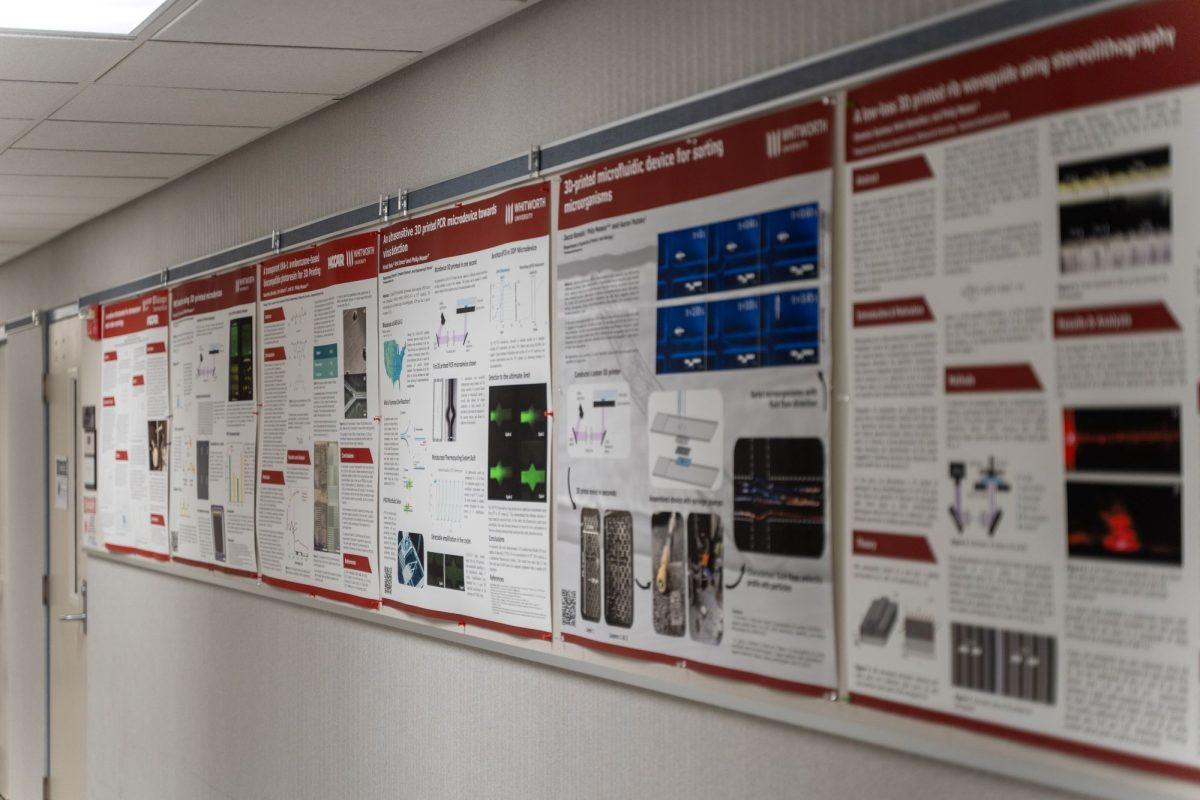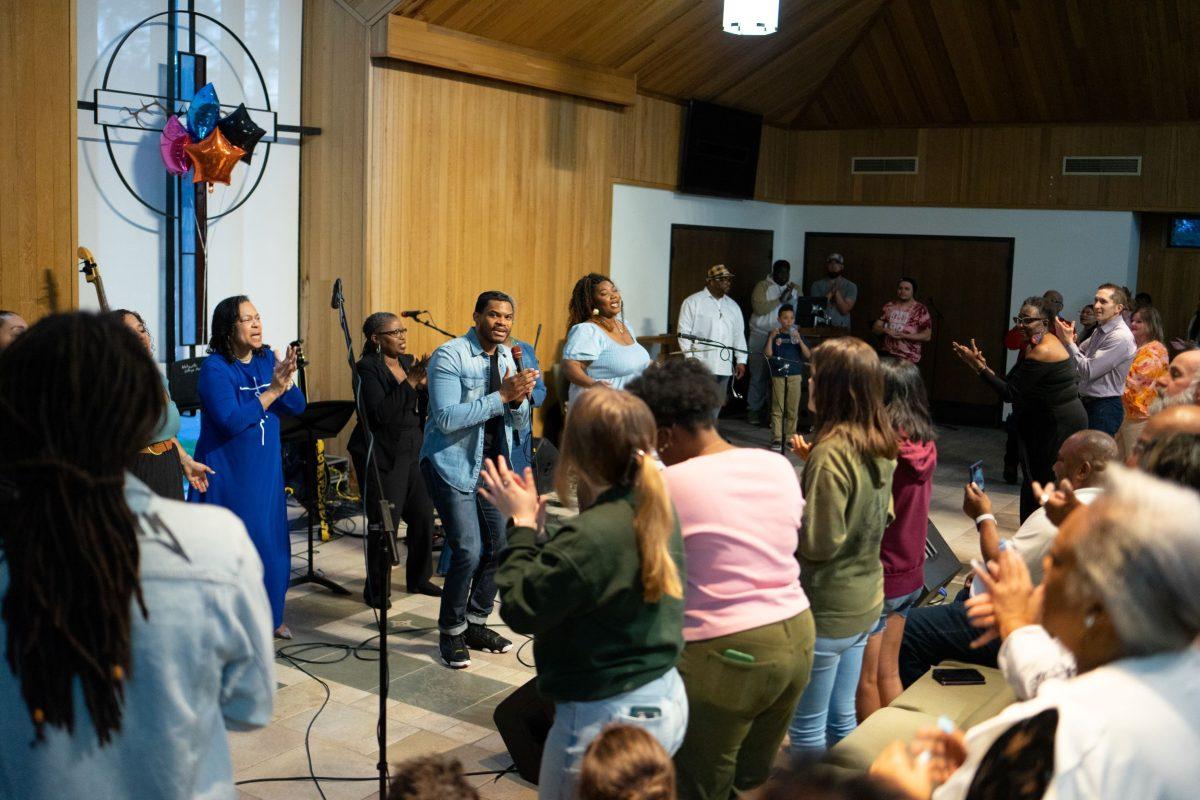Professor at Eastern Washington University J. William T. Youngs spoke on “Expo ’74 and the Transformation of Spokane” Wednesday Feb. 22. He explained how the Expo altered Spokane’s environmental impact.
Spokane is one of the only cities in the world to have a river running through the middle of downtown, Youngs said. This beautiful water feature is in part because of the Expo in 1974.
“I think we tend to overlook the glory and accomplishments of our own neighborhood,” Youngs said.
Prior to the Expo, the Spokane Falls were primarily used for their power and industry value. Such strong currents easily powered large mills and factories.
“Their [Spokane falls] fate was to have tremendous utilitarian value,” Youngs said.
Prior to the 1970s, downtown Spokane was an industrial center, two large railroad stations and their tracks occupied much of the space.
Yet in the early 1970s, an urban planner named King Cole came up with a near impossible idea to save the natural beauty of Spokane. Spokane was going to host the World’s Fair.
“King Cole was really the George Washington of the environment center of Spokane,” Youngs said.
Started in 1851 in London, England, the World’s Fair event brings countries together in one location to present pavilion or booths featuring their country. The term Expo is now synonymous with World Fair after its use in Expo ‘67 in Montreal.
Much like the Olympics, specialty structures, locations and buildings are constructed for the event. Paris has the Eiffel Tower from the 1889 World’s Fair and Seattle has the Space Needle from the 1962 World’s Fair.
At the time, Spokane would be the smallest city ever to host the event, yet Cole was not dissuaded. The delegation from Spokane was competing against Philadelphia, yet when Philadelphia was forced to pull out Spokane was ready and willing.
Spokane was going to be the site of Expo ‘74 but before the world descended on the small city, multiple changes had to be made, namely the removal of the railroad tracks from downtown.
“They are going to say one of two impossible answers: no or hell no,” Youngs said with a laugh.
Yet as the current landscape of downtown attests, Cole succeeded in removing the tracks. The clock tower in Riverfront Park is a monument to the two old stations that were torn down.
Expo ‘74 was the first World’s Fair event to have an environmental theme “Celebrating Tomorrow’s Fresh New Environment”. This tradition has continued at each subsequent event, including Expo 2010 in Shanghai, China.
Young said, three events during the 1970s shaped the conversation about environmental issues: the first Earth Day in 1970, the United Nations Conference on the Human Environment in 1972 and Expo ‘74.
Whitworth incorporated the theme of the environment into the children’s theater productions put on during the fair.
“We were one of lots of community groups that were invited participate,” campus historian Dale Soden said.
Whitworth was the last booth to enter the Expo a mere five weeks before the fair was set to open. They constructed a 50-foot geodesic dome, that could seat 200 people in a mere four days.
“Children certainly must be considered an important component of ‘tomorrow’s fresh new environment.’ We hope to contribute something to their growth but offering this opportunity to be involved in an entertaining and creative learning experience during their visit to the World’s Fair,” former Whitworth President Edward Lindaman said in the April 1974 issue of Whitworth Today.
Not only did Whitworth contribute an event to the fair but the campus was also used for accommodations.
“The Village was used using the summer of 1974 to house people who were looking for housing during the fair,” Soden said.
At $5 for the first night and $4.50 for each additional night, Whitworth rented out 700 beds a night. Student administrators helped accommodate visitors and supervised over 35 fellow students, employed as hosts, maids and janitors.
“Campus visitors will be offered a variety of entertainment, recreation and learning experiences on campus during the Expo summer,” according to the April 1974 issue of Whitworth Today. “Highlights include a two-day Arts Administration Workshop, headlined by Alvin Reiss of New York, and expert in the field; a ceramic workshop by Carelton Ball, one of the nation’s leading potters; and a one-woman dramatic show by Peggy Cowles, ‘59. The U.S. National Volleyball Team, headquartered on campus, will offer an exhibition game and clinic. The physical education department plans to offer supervised and unsupervised recreation opportunities for children and adults. Also being planned are a number of ‘spontaneous’ musical events and happenings.”
Whitworth hosted children’s theatre and flash mobs for an event that not only changed the dialogue on environmental issue, but also simultaneously transformed Spokane into the city it is today.
Contact Caitlyn Starkey at [email protected].





